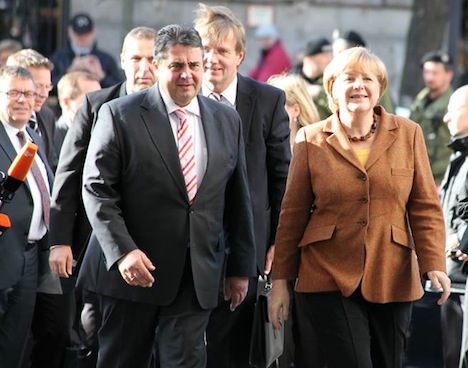In an overwhelming endorsement of Germany’s new grand coalition, party members of the center-left Sozialdemokratische Partei Deutschlands (SPD, Social Democratic Party) have approved the governing agreement between the SPD and chancellor Angela Merkel’s center-right union.![]()
Nearly 370,000 German party members approved the agreement by the lopsided margin of 75.96% in a vote that was held over the past two weeks, the results of which were announced earlier today. The vote followed the November 27 agreement struck among SPD leaders and leaders of Merkel’s Christlich Demokratische Union Deutschlands (CDU, Christian Democratic Party) and Merkel’s Bavarian allies, the Christlich-Soziale Union (CSU, the Christian Social Union).
So what next?
Expect Merkel to name a new cabinet within the next 24 hours, and expect her formal reelection as chancellor to come early next week.
You can read more background about the coalition deal here and here, but here’s a short list of points to keep in mind:
- Coalition arithmetic: Merkel’s CDU-CSU union holds 311 seats in the lower house of Germany’s parliament, the Bundestag, just five short of an absolute majority, but she actually lost seats in the Bundesrat, the upper house. While the September elections marked the largest victory for the CDU-CSU in nearly two decades and a huge personal triumph for Merkel, their coalition allies, the Freie Demokratische Partei (FDP, Free Democratic Party) lost all of their seats in the Bundestag after failing to cross the 5% electoral threshold. Together with the SPD’s 192 seats, the new government will be able to draw on the support of 79.8% of the Bundestag. That leaves Die Grünen (the Greens) and Die Linke (the Left Party) as the sole opposition parties on the left — though the possibility of a so-called ‘red-red-green’ government among the Greens, the Left and the SPD could conceivably form a historic (and narrow) coalition if relations sour between Merkel and the SPD.
- Domestic policy: The deal is very pro-SPD, all things considered — Merkel agreed to an across-the-board hike in Germany’s minimum wage to €8.50, more labor market regulation, increases in pensions, and the ability to retire at age 63 (at a time when most European countries are raising their retirement ages), and between €20 billion and €40 billion in additional infrastructure spending. The coalition deal rules out additional taxes or additional issuance of German debt, a key CDU-CSU campaign pledge. The minimum wage, in particular, explains why the SPD membership so widely endorsed the deal, and the deal and today’s party vote is a strong endorsement of SPD leader Sigmar Gabriel (pictured above, left, with Merkel). Critics on both the left and the right have accused the coalition leaders of a failure of policy ambition, given the size of the coalition.
- Foreign policy: Banking union remains the top substantive policy issue for discussion at the EU level, though Merkel has floated the idea of a push for an EU treaty that would consolidate more fiscal power at the supranational level in exchange for further assistance to the weakest eurozone economies (which remain, despite some improvement in Europe’s economy in 2013, in economic depression, in some cases with unemployment rates in excess of 25%). If British prime minister David Cameron wins reelection in May 2015, Merkel will be keen on using treaty negotiations as a means of providing more opt-outs to the United Kingdom, both in exchange for its broad support for a relatively conservative EU fiscal policy and to bolster Cameron in any British referendum on future EU membership.
- Personnel: The 15 ministers of the new government are expected to be named on Sunday, with the SPD receiving six ministries. It’s widely expected that Frank-Walter Steinmeier, who served as foreign minister in the first grand coalition government between 2005 and 2009, will return in that role. Wolfgang Schäuble, a longtime CDU statesman, who served as finance minister in the previous CDU-FDP government between 2009 and 2013, is expected to retain that role. Gabriel is expected to become deputy chancellor and economy minister, though it’s unlikely that CSU leader and Bavarian minister-president Horst Seehofer will join the cabinet. Ursula von der Leyen, a rising star in CDU politics, and a previous labor and family minister, is thought to be a leading candidate for defense minister or interior minister.
- Eyes on the next election: In both the 2009 and 2013 federal elections, the SPD was seen to have suffered from voters who gave Merkel all of the credit for the first grand coalition between 2005 and 2009. What’s more, the grand coalition left the SPD struggling to draw distinctions with the ideologically flexible Merkel on major economic policy and on Germany’s approach to the eurozone crisis. While the initial coalition deal is a huge policy victory for the SPD, off the heels of its second-worst postwar election result, the SPD will seek out greater distance during its second grand coalition with Merkel. It would not be surprising if the coalition doesn’t last a full four-year term, especially if Merkel fails to ‘go big’ on Europe. All the same, after choosing as its chancellor candidate two federal politicians in the last two elections (Steinmeier and former finance minister Peer Steinbrück), don’t be surprised if the SPD looks to its state-level leaders to lead the party in the next election, in 2017 or before. Topping that list is Hannelore Kraft, the popular minister-president of North-Rhine Westphalia, Germany’s most populous state that lies at the core of Germany’s industrial heartland. Kraft won a resounding reelection in May 2012, and she’s pursued some of the most interventionist pro-growth policies in Germany (and Europe), in contrast to the conservative economics of Merkel’s two terms in government.

One thought on “SPD party membership approves German grand coalition”